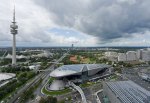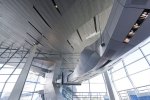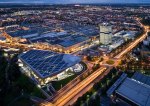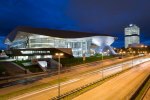![sustainable design, green design, bmw welt, factory, eco-friendly, natural ventilation, Coop Himmelb[l]au](https://i0.wp.com/www.inhabitat.com/wp-content/uploads/bmw-welt-5772.jpg)
In a perfect world we’d all be getting back to our zero energy, prefabricated homes by foot, bike or public transport, but on a planet where cars won’t be disappearing anytime soon, it’s nice to know that some car companies are trying to reduce their carbon footprint when producing new vehicles. In 2003 BMW set out a design competition for a new building and distribution center located in Munich, Germany. The results were more than grand; not only is the new BMW Welt aesthetically pleasing with its sinuous curves and gleaming façade, but it was also consciously designed to save energy in its production of cars through efficient solar heating and natural ventilation systems.
The BMW Welt was designed by architects Coop Himmelb[l]au in five thematic blocks: Hall, Premiere, Forum, Tower, and Double Cone, where areas have been reserved for car production, exhibition space, restaurants, shops, and even a business center. Coop Himmelb[l]au, not unfamiliar with designing large and complex spaces, developed a totally integrated and ecologically friendly air system combining both low and high tech methods to create optimal air circulation.
![sustainable design, green design, bmw welt, factory, eco-friendly, natural ventilation, Coop Himmelb[l]au BMW-Welt](https://i0.wp.com/www.inhabitat.com/wp-content/uploads/bmw-welt-7032.jpg)
The multifunctional Hall, which sits as the centre point of the complex, was designed as a solar-heated, naturally ventilated sub-climatic area, removing the normal requirements for building heating and ventilation. Instead, a natural air supply is generated by thermal currents, wind pressure and turbulences when air accumulates in the area of the façade and roof projection. Air intake and outflow take place through automatically controlled and strategically placed vents providing the Hall with all its air needs.
The system proves to be especially beneficial to the Premiere section where BMW Welt produces its cars, and which directly opens up to the Hall. Because of the intensive exhaust gases that are released during the delivery process, and the subsequent energy heavy regulation typically required for air cleanup, the system was further fine-tuned to adjust the volume of air intake and outflow and to extract the exhaust fumes directly and pump in fresh air. A considerable feat given that BMW assumes a turnover of about 40 cars per hour, for a total of 250 cars per day.
On top of all this, the Forum, Tower and Double Cone are definitively public spaces, and have specially incorporated air systems to meet the comfort needs of their occupants while utilizing natural ventilation when possible.









Good for BMW. I feel like sometimes people forget it’s just as important to be environmentally friendly while creating a car as it is to have an environmentally friendly car. Not to mention, the building looks awesome!
0 Pingbacks